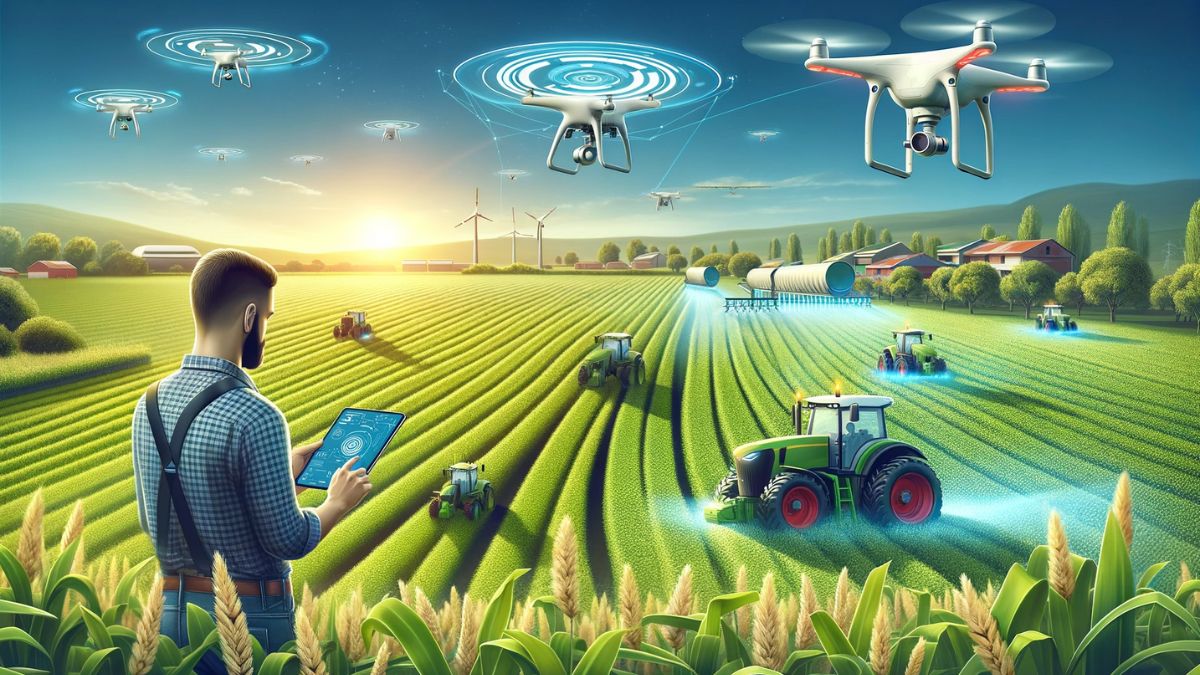AI in Crop Management: The Emerging Role of Artificial Intelligence

In the ever-evolving landscape of agricultural technology, the emergence of Artificial Intelligence (AI) stands as a transformative force, redefining the paradigms of crop management. This article delves into the multifaceted role of AI in agriculture, exploring how it revolutionizes traditional farming practices. From predictive analytics that forecast weather patterns and pest infestations to AI-driven precision farming techniques, this technology is not just an innovation but a necessity in addressing the growing challenges of food production.
As the world grapples with climate change, population growth, and resource scarcity, AI emerges as a beacon of hope, promising enhanced efficiency, sustainability, and productivity in the agricultural sector. This article aims to uncover the myriad ways AI is being integrated into crop management, signaling a new era of smart farming.
Understanding AI: Basics and Applications in Agriculture
Artificial Intelligence (AI) in agriculture is a game-changer, leveraging complex algorithms and machine learning to transform traditional farming into a high-tech industry. At its core, AI involves creating systems capable of learning, adapting, and making decisions, which is crucial in unpredictable fields like agriculture. In the agricultural context, AI is used for a variety of applications, such as analyzing soil health, optimizing planting strategies, and even managing entire farming operations remotely.
For example, AI-powered drones can survey vast farmlands, providing real-time data on crop health, soil conditions, and more. This technology not only enhances farm productivity but also aids in resource management, ensuring that inputs like water, fertilizers, and pesticides are used efficiently.
Predictive Analytics: Forecasting and Mitigating Agricultural Risks
Predictive analytics in agriculture harnesses AI to anticipate and respond to potential challenges like weather events, pest infestations, and crop diseases. By analyzing vast datasets, AI models can predict adverse conditions before they occur, enabling farmers to take preemptive actions. For instance, AI algorithms can analyze historical weather data to forecast droughts or heavy rainfall, helping farmers to adjust their irrigation systems accordingly.
This proactive approach to farming mitigates risks and enhances crop yields, making agriculture more resilient to environmental fluctuations. Predictive analytics also plays a vital role in supply chain management, forecasting market demands and helping farmers to plan their crop production more effectively.
Precision Farming: How AI Enhances Crop Cultivation
Precision farming, powered by AI, marks a significant shift from traditional farming methods. AI-driven precision agriculture involves using data and analytics to make farming practices more accurate and controlled. This approach uses sensors, GPS, and AI algorithms to assess field conditions and apply inputs like water, fertilizer, and pesticides in precise quantities at the right time and place.
By tailoring these inputs to the specific needs of each plant, precision farming significantly increases the efficiency of resource usage, reducing waste and environmental impact. Moreover, AI helps in identifying the optimal planting patterns and harvest times, ensuring higher crop quality and yield.
AI-Driven Pest Control: Revolutionizing Plant Protection
AI-driven pest control is revolutionizing the way farmers combat crop threats. Utilizing AI, farmers can now detect and identify pest infestations accurately and early, allowing for timely and targeted interventions. AI-powered systems use image recognition to scan crops for signs of pests and diseases, providing alerts when action is needed.
This not only reduces the reliance on pesticides but also ensures that they are applied in a more environmentally friendly and cost-effective manner. AI algorithms can also predict pest outbreaks based on environmental data, helping farmers to prepare and protect their crops in advance.
Irrigation and Water Management through AI
Irrigation and water management are critical aspects of farming, significantly enhanced by AI technologies. AI systems can monitor soil moisture levels and weather forecasts to optimize irrigation schedules, ensuring that crops receive the right amount of water at the right time. This precise water management leads to significant water savings and improved crop yields.
AI also helps in detecting leaks and inefficiencies in irrigation systems, further conserving water resources. In regions facing water scarcity, AI-driven irrigation systems are vital for sustainable agriculture, balancing crop needs with environmental conservation.
Crop Health Monitoring: AI’s Role in Disease Detection and Prevention
AI plays a pivotal role in crop health monitoring, offering advanced solutions for disease detection and prevention. By analyzing images from drones or satellites, AI can identify early signs of disease or nutrient deficiencies in crops, often before they are visible to the human eye. This early detection enables farmers to take prompt action, applying targeted treatments that can save entire harvests.
AI systems also analyze data trends to predict disease outbreaks, allowing for preventive measures. This technology not only protects crop health but also reduces the overuse of chemicals, contributing to safer and more sustainable farming practices.
Automated Harvesting: The Role of AI in Efficient Crop Collection
Automated harvesting is another area where AI is making a significant impact. AI-enabled robots and machines can identify ripe crops and harvest them with precision, minimizing waste and reducing the need for manual labor. This technology is especially beneficial for crops that require delicate handling or are labor-intensive to harvest.
AI-driven harvesters can work around the clock, increasing efficiency and productivity. Additionally, these systems collect data on crop quality and yield, providing valuable insights for future cultivation strategies.
Data-Driven Decision Making: Leveraging AI for Farm Management
In the realm of farm management, AI facilitates data-driven decision-making. Farmers can use AI to analyze a wide range of data, from weather patterns to market trends, making informed decisions about crop selection, planting schedules, and resource allocation.
This approach not only improves farm efficiency but also enhances profitability and sustainability. AI tools can also automate routine tasks, like scheduling and record-keeping, allowing farmers to focus on more strategic aspects of their operations.
The Environmental Impact: AI and Sustainable Farming Practices
The environmental impact of AI in agriculture is profound, driving more sustainable farming practices. AI helps in optimizing resource usage, reducing the carbon footprint of farming activities. For example, precision agriculture reduces the overuse of fertilizers and pesticides, lowering the risk of soil and water pollution.
AI also supports sustainable land management practices, like crop rotation and cover cropping, enhancing soil health and biodiversity. By enabling more efficient and eco-friendly farming, AI is not only beneficial for farmers but also for the planet.
Future Trends: AI’s Evolving Role in Agriculture
Looking ahead, the role of AI in agriculture is set to evolve further, with emerging technologies promising even greater advancements. Future trends include the integration of AI with other technologies like blockchain for supply chain transparency and the Internet of Things (IoT) for enhanced connectivity and data collection.
Innovations like autonomous tractors and AI-powered vertical farms are also on the horizon, signaling a shift towards more automated and urban farming practices. As AI continues to advance, it holds the potential to address global food security challenges, making agriculture more efficient, resilient, and sustainable.
What are the Cost Implications of Integrating AI into Agriculture?
Integrating AI into agriculture involves substantial initial investment in technologies like sensors, drones, and data analysis platforms. While this may pose a financial challenge, particularly for small-scale farmers, the long-term benefits can be significant. AI optimizes resource use, improves yield, and reduces waste, leading to potential cost savings and increased profitability over time. The key is balancing upfront costs with expected gains in efficiency and productivity.
How Does AI Contribute to Organic Farming?
AI contributes significantly to organic farming by enabling more precise and efficient farming practices. It aids in the early detection of pests and diseases, reducing the need for chemical interventions. AI also optimizes water and nutrient usage, contributing to healthier soil and sustainable farming practices. By leveraging data analysis, AI can help maintain the balance between crop health and environmental conservation, a core principle of organic agriculture.
Can AI Help in Addressing the Challenges of Small-Scale Farmers?
AI has the potential to greatly assist small-scale farmers by providing access to information and resources that were previously unavailable. It can offer insights into optimal planting times, soil health, and efficient water usage, helping to maximize yields and reduce costs. Despite initial investment challenges, AI-driven tools can be scaled down to suit smaller operations, making them increasingly accessible and beneficial for small-scale agriculture.
What is the Role of AI in Livestock Management?
In livestock management, AI plays a vital role in monitoring animal health, tracking behavior, and optimizing breeding. It can analyze data from sensors to detect early signs of illness, track nutritional needs, and even predict reproductive cycles. This leads to healthier livestock, more efficient farms, and potentially higher quality dairy and meat products. AI-driven systems can also reduce the labor-intensive aspects of livestock management, allowing for more efficient resource allocation.
How Does AI Assist in Climate Adaptation Strategies for Agriculture?
AI assists in climate adaptation strategies by providing predictive analytics for weather patterns, crop suitability, and resource management. It helps farmers anticipate and prepare for climatic changes, such as droughts or floods, and suggests appropriate adaptive techniques. AI-driven models can recommend the best crops for changing conditions and optimize irrigation to conserve water. These capabilities are crucial for sustaining agricultural productivity in the face of climate change.
What are the Security and Privacy Concerns with AI in Agriculture?
The integration of AI in agriculture raises significant security and privacy concerns. Data collected on crop yields, farming practices, and land use is valuable and sensitive. There’s a risk of unauthorized access, data breaches, and misuse of this information. Ensuring data security and farmer privacy requires robust cybersecurity measures, clear data ownership policies, and careful regulation to protect both farmers and the agricultural industry.
How Does AI Interface with Traditional Farming Knowledge and Practices?
AI interfaces with traditional farming knowledge by enhancing and complementing established practices with data-driven insights. It respects and builds upon the experiential knowledge of farmers, offering tools that can refine and improve traditional methods. This integration helps in optimizing crop rotation, soil health management, and pest control, combining the best of both worlds for more efficient and sustainable farming.
What Training or Skills are Required for Farmers to Adopt AI Technology?
Adopting AI technology in farming requires basic digital literacy, an understanding of data analysis, and a willingness to adapt to new practices. Training programs often focus on how to operate AI tools, interpret data, and make informed decisions based on AI recommendations. Continuous learning is essential as AI technologies evolve. Accessibility and user-friendliness of technology are crucial to encourage wider adoption among farmers.
How is AI Being Used to Improve Food Supply Chain Management?
AI is revolutionizing food supply chain management by enhancing efficiency, transparency, and traceability. It helps in forecasting demand, optimizing logistics, and reducing waste. AI-driven systems can track the journey of produce from farm to consumer, ensuring quality and safety. This technology also aids in responding to market fluctuations, managing inventory, and improving the overall resilience of the supply chain in the face of disruptions.
What are the Limitations and Challenges of AI in Agriculture?
The limitations and challenges of AI in agriculture include high implementation costs, the need for reliable data, and accessibility issues, particularly in remote or under-resourced areas. There’s also the challenge of integrating AI with diverse farming systems and practices. Ethical considerations, such as job displacement and data privacy, add complexity. Continuous research and development, along with policy support, are required to address these challenges and make AI a truly transformative tool in agriculture.

